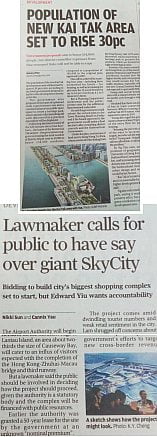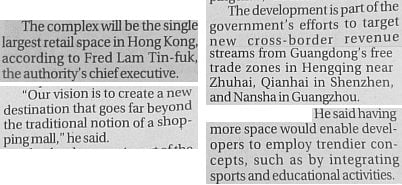Hong Kong is urged to seethe with envy because Beijing has declared plucky little obedient Macau the ‘Yuan clearing centre for the Portuguese-speaking world’. Lucky residents of the former enclave will be up to their knees in Renminbi gushing in from Cape Verde and Guinea-Bissau, while naughty rebellious ungrateful Hongkongers starve and their city fades into insignificance.
Meanwhile back on Planet Earth, Jake van der Kamp writes that Beijing’s anti-corruption clampdown has resulted in Macau’s casino-dominated economy shrinking by an incredible 35% since 2013. This is the sort of decline that resulted in starvation in North Korea in the 1990s, and something close to social breakdown in Greece over the last few years.
And yet… Everyone in Macau is pretty happy and carrying on as if nothing had happened. That’s because ordinary people there didn’t see many of the benefits when the gambling industry boomed earlier in the 2000s, pushing per-capita GDP above Hong Kong’s. And they’re not experiencing much of a crunch as the bubble deflates. A similar phenomenon applies in Hong Kong, where a massive increase in tourist figures contributed to supposedly impressive GDP growth around 2003-13, while median household incomes remained level, and probably fell if you allow for inflation (let alone quality of life).
 In short: mass-tourism is not only Hell, but bad economics.
In short: mass-tourism is not only Hell, but bad economics.
So what a delight it is to read that the Hong Kong government has had the uncharacteristic sense to scrap plans to cover much of the old Kai Tak area with hotels, hotels and more hotels for the MICE and selfie-stick pestilences, and actually build housing – some of which may even be available for local people rather than Mainland money-launderers.
Sadly, this refreshing approach has not reached Kai Tak’s replacement out at Chek Lap Kok. The airport bosses have announced a ‘vision’ for a new destination going far beyond the traditional notion of a shopping mall – a retail-dining-entertainment hub-complex three times the size of Harbour City with ‘trendier concepts’ (plus mega-hotel, naturally). If that’s not depressing enough, they say the idea is to target ‘new cross-border revenue streams’ from free-trade zones like Nansha, Qianhai and Hengqing.
These places are basically lame real-estate/arbitrage plays, but the officials presumably mention them because it sounds cool and gives face to Mainland authorities. The ‘vision’ is yet another glitzy maze full of Louis Vuitton, Body Shop, Chow Sang Sang and McDonalds aimed at yet more zombie-shopper hordes from Zhuhai, Zhongshan and Shenzhen.
If we are to have a gargantuan bridge linking Lantau to Zhuhai, and a third runway, we must have an exciting Destination Concept Theme-Hub to induce people to use them. We must cram more people in to justify the infrastructure. And the suitcase-dragging zombie-shopper Mainlanders – last seen heading to Seoul or Paris or speculating on their fourth apartment in Ningbo – is the best that we can think of. Such originality! Gold Bauhinia Medals all round!



On the bright side, if the Mainland tourists shop at that hellish dystopian horror of an airport mall they won’t have to come all the way to where the rest of us are. That’s worth it, right?
Post-retirement directorships all sorted. What’s next on the bucket list?
Surely you forgot São Tomé et Principe…every colony the Portuguese touched ended in disaster, just like Macao. At least they didn’t blow them up, like the French.
Mm…black on LIGHT grey…every day, in every way….
We do need more shops. Sad though that in TST, you can walk past five, sometimes ten and see not a customer. How do they pay the rent?
São Tomé et Principe: it used to be called Fernando Po, named after one Fernando Po. I shit you not.
Meathumper makes a valid point: bring in the hordes from Zhuhai, Zhongshan and all the way op to Foshan via the new bridge, let them shop and entertainment-hubbed till they drop, then direct them via the same bridge back to the old village.
I once took a taxi from Guangzhou to Zhuhai on a dark and stormy night. That stretch of Guangdong is remarkable: there is nothing there.
Kai Tak closed in 1998.
That’s 18 full years ago!
How bloody long does it take to plan and build in the area!
Joe Blow,
Unusually, you are wrong. Sao Tome e Principe was not once called Fernando Po. Fernando Po (now called Bioko) is an island constituting the northernmost part of another former Portuguese colony, Guinea Bissau.
And take note, Georgie, it’s “e Principe”, not “et Principe”.
@Joel
Didn’t you get the memo Joel? There’s a critical land shortage in Hong Kong. Surely you heard about the critical land shortage? I thought everyone had heard of the critical land shortage. The former site could not be put to good use in those looooong 18-years due to the critical land shortage. That’s what my sources have told me. A critical land shortage. Or, put differently, a critical shortage. Of land.
Thank you for reading. This concludes this public service harassment.
Red Dragon and Joe Blow,
Fernando Po (Fernando Poo in Spanish) is actually part of Equatorial Guinea, which was once Spanish Guinea. Portugal ceded the island to Spain in the 1770s, keeping nearby Sao Tome and Principe.
Quite right, CH. Mea culpa.